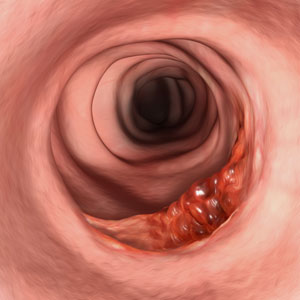Rectal Cancer

What is Rectal Cancer?
Cancer is the uncontrolled division of abnormal cells. Rectal cancer is defined as cancer that forms in the tissues of the rectum. The rectum is the final six inches of the colon (large intestine or large bowel). It begins at the end of the last section of your large intestine and ends when it reaches the narrow, short passageway leading to the anus. The rectum connects the anus to the large intestine.
Rectal cancer is most often diagnosed with a colonoscopy, and the cancer stage depends upon to what extent cancer has spread. Although rectal cancer affects people of all ages, it is common in people aged 60 and above and men have a higher risk than women.
Causes of Rectal Cancer
Rectal cancer occurs when healthy cells in the rectum mutate (develop changes) and grow out of control. The condition may also occur when a mass of abnormal tissue growths called polyps develop on the inner wall of the rectum and turn cancerous. Eventually, the cancer cells invade and destroy healthy tissue close by and ultimately metastasise (spread) to other parts of the body, disrupting their function.
Risk Factors for Rectal Cancer
Some of the risk factors for rectal cancer include:
- Smoking
- Excess alcohol consumption
- Obesity
- Type II diabetes
- Physical inactivity
- Advanced age
- Family history of rectal cancer
Signs and Symptoms of Rectal Cancer
Some of the signs and symptoms of rectal cancer include:
- Abdominal pain
- Fatigue or weakness
- Unexplained weight loss
- Narrow stool
- Painful bowel movement
- Mucus or blood in stool
- Changes in bowel habits, such as constipation or diarrhoea
Prevention of Rectal Cancer
Risk of developing rectal cancer can be reduced by:
- Regular cancer screening from age 50 and above
- Regular exercises
- Stopping smoking
- Moderate alcohol consumption
- Maintaining a healthy body weight
- Consuming a variety of whole grains, vegetables, and fruits
Diagnosis of Rectal Cancer
The diagnosis of rectal cancer may be made via the following:
- Digital rectal exam: A physical examination that involves inserting a gloved finger into the rectum to feel for lumps and to look for blood in the stool.
- Sigmoidoscopy: A procedure in which an instrument called a sigmoidoscope is introduced through the anus to look inside the rectum and section of the colon for abnormal tissues.
- Colonoscopy: A procedure in which an instrument called a colonoscope is utilised to examine the rectum and the whole colon for polyps, abnormal areas, or cancer.
- Computed tomography (CT) scan: This is a special X-ray that creates a computerised image of the colon and rectum for a detailed evaluation of abnormal tissues.
- Barium enema: A procedure in which barium fluid is administered into the rectum, and a series of X-rays are captured. This enables your physician to look for abnormal growths in the rectum and colon.
- Biopsy: If the results of the tests are found to be abnormal, your physician may collect a small piece of abnormal tissue for examination under a microscope.
- Genetic risk assessment: This is a way of identifying certain genes that may increase your chances of developing rectal cancer.
Treatment for Rectal Cancer
Treatment depends on the stage of rectal cancer and can involve one or more of the following treatment options:
Chemotherapy: A type of cancer treatment that involves the use of one or more anti-cancer drugs to treat rectal cancer.
Radiation therapy: High-energy particles or waves such as X-rays and gamma rays are used to kill or damage cancerous cells.
Targeted cell therapy: This involves the use of drugs that specifically target certain proteins in cancer cells to destroy them, but do not damage other cells of the body.
Cryosurgery: A procedure that utilises a cryoprobe or cold liquid to destroy abnormal tissues.
Radiofrequency ablation: A minimally invasive procedure in which electrical energy and heat are used to destroy cancer cells.
Immunotherapy: A healthy immune system is necessary to fight cancerous cells. Immunotherapy involves administering interleukins or interferons (types of proteins) to naturally defend your body against cancerous cells.
Surgery (proctectomy): Proctectomy is the surgical removal of all or part of the rectum. It is the treatment of choice for most people with advanced rectal cancer. It is performed under general anaesthesia by an open-surgery method or by laparoscopic method. Laparoscopy is a minimally invasive surgical procedure that uses a laparoscope to diagnose and treat various disorders. A laparoscope is a thin fibre-optic device fitted with a camera and lens. Images from the camera are transmitted to a monitor for your doctor to view the inside of your body and carry out the necessary repair.
A person with rectal cancer may require a colostomy. An opening called a stoma is created by your surgeon on the outside of your abdomen, through which faeces pass to be collected into a colostomy bag.








